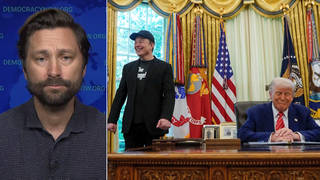
Guests
- Rami KhouriPalestinian American journalist and senior public policy fellow at the American University of Beirut.
We look at how Israel’s war on Gaza has inflamed tensions in the Middle East and threatens to pull other countries into the fighting, including the United States. The Pentagon says it has intercepted a number of drones and missiles launched by Yemen’s Houthi forces — known as Ansarallah — in the Red Sea aimed at disrupting international shipping, with the group vowing to continue the attacks on ships in solidarity with Palestinians in Gaza. The U.S. and Israel have also exchanged fire with groups in Lebanon, Iraq and Syria, and violence continues to increase in the occupied West Bank. The growth of forces openly fighting against Israel and the U.S. is a major development in the Middle East that most Western commentators do not fully understand, says Rami Khouri, a veteran Palestinian American journalist and a senior public policy fellow at the American University of Beirut. This “axis of resistance” is largely motivated by outrage over the treatment of Palestinians, he says. “The U.S. and Israel at some point need to acknowledge that the Palestinian people have rights that are equal to the Israeli people.”
Transcript
AMY GOODMAN: We had hoped we’d begin today’s show in Gaza, where the Health Ministry says the overall death toll now tops 21,000, including over 8,000 children, but communications in Gaza are now down for the umpteenth time, and neither we nor our colleagues with the Associated Press can reach our guest in Rafah in southern Gaza.
As we reported in headlines, the Pentagon is saying it intercepted and shot down 12 drone attacks, three anti-ship ballistic missiles and two land attack cruise missiles launched by Houthi forces in the Red Sea during a 10-hour period on Tuesday, as concerns grow over a wider regional war in the Middle East. The Yemen-based Houthis have vowed to keep carrying out attacks on ships in the Red Sea to show solidarity with Palestinians in Gaza.
This comes as the Pentagon said it carried out three strikes on Iraqi territory Monday at President Biden’s direction in response to a drone attack on an air base in Erbil, Iraq, that wounded three U.S. service members, one of them critically. Iraq’s government said the U.S. attacks killed one member of the Iraqi security forces and wounded 18 people, including civilians. It condemned the Pentagon’s, quote, “unacceptable attack on Iraqi sovereignty.”
Meanwhile, Turkey’s military launched airstrikes in northern Iraq and Syria over the weekend, targeting bases, shelters and oil facilities operated by the Kurdish PKK militia. The attacks came after the Turkish Defense Ministry said 12 of its soldiers were killed in northern Iraq in battles with PKK fighters.
Elsewhere, an Israeli airstrike on northern Syria on Monday killed Sayyed Razi Mousavi, a senior adviser in Iran’s Revolutionary Guard Corps responsible for coordinating Iran’s military alliance with Syria. Iran’s Foreign Ministry condemned the attack, saying, quote, “Iran reserves the right to take necessary measures to respond to this action at the appropriate time and place.”
For more on all of this, we’re joined in Boston by Rami Khouri, Palestinian American journalist, senior public policy fellow at the American University of Beirut. His new piece for Al Jazeera is headlined “Watching the watchdogs: Why the West misinterprets Middle East power shifts.”
Well, why don’t you tell us why the West misinterprets these power shifts, Rami Khouri? And do you see what’s happening in Gaza and the West Bank as leading to a wider Middle East war?
RAMI KHOURI: Thank you for having me, and thanks for the great work you do every morning.
The second part of your question, I can pretty surely say that I don’t expect the wider war. But wider wars don’t usually happen by planning. They often happen by accident. So it could happen. But I don’t think so, because, first of all, a wider war isn’t going to solve anything; second of all, people, generally, on all sides, don’t want to fight a wider war, and certainly civilian populations are against it.
Your first question, the short answer of why the mainstream media in the U.S. and most of the Western world doesn’t follow, analyze, acknowledge what I think are the biggest geostrategic changes taking place in this Middle East region in the last maybe 30, 40 years — the short answer is that the U.S. and Israel are joined in a kind of settler colonial assault on Palestinian rights. They have been for half a century. The British and the Zionists started this in the 1910s, and then Israel was created. And after '67, the U.S. became the main supporter of Israel. So this is a centurylong conflict that has pitted Israel, Zionism and Western supporters against Palestinian rights. Other Arabs got involved, but it's essentially a Palestinian-Israeli, Palestinian-Zionist struggle.
And the U.S. doesn’t want to acknowledge anything — the U.S. mainstream media, broadly, doesn’t want to acknowledge anything that doesn’t fit the script that the United States has a righteous policy, that the Israelis have a moral army, that what they’re doing is legitimate defense, and that all the other people in the region who challenge them or fight them are either terrorists or just, you know, violence-loving Muslims and Arabs beyond any help that anybody can give them — they just love to kill Jews and Americans. So, this is the kind of nonsense that permeates so much of the mainstream media.
And this is why I mentioned in this column that this tremendously important sign that we had just last week really needs to be appreciated. And that sign was that the Yemeni Ansarallah group, but people call them the Houthis — you know, one sign of good reporting is to use the people’s proper name. So, Hezbollah, Hamas, Ansarallah, that makes a difference. And so, these three groups, Hezbollah, Hamas, Ansarallah, are part of a regional network of groups, Arab groups, nationally anchored, one in — Hezbollah in Lebanon, Hamas in Palestine, Ansarallah in Yemen, who coordinate very closely with each other and coordinate and get assistance from Iran, just as Israel coordinates closely and gets huge amounts of assistance from the U.S. This is how, you know, the world works. But the difference is that Hezbollah and Hamas have already shown that they can develop technical, military and other capabilities that can check the Israeli-American assault on Palestinian rights.
The U.S. and Israel can wipe out the entire Middle East if they want, the entire Arab region, with their nuclear weapons and — sorry — other facilities. But this wouldn’t solve anything. But the U.S. and Israel at some point need to acknowledge that the Palestinian people have rights that are equal to the Israeli people, and the two should live side by side, or if they want to live in one state, that’s up to them, but probably two adjacent states.
The Hezbollah-Hamas-Ansarallah combination brought us last week to a situation where at one moment — and it’s kind of still going on — the U.S. and/or Israel were exchanging military fire with Hezbollah in Lebanon, Hamas in Gaza, some other Palestinian groups in the West Bank, Ansarallah in Yemen, the Popular Mobilization Forces, Iranian-backed militant groups, in Iraq, and the Syrian government, which is supported by Iran. So the U.S. and Israel were actively engaged, small levels, low levels, but actively engaged in military action against six opponents on six different fronts. But those opponents were all coordinating together.
And the more important point is that — not just that they coordinate together, but we’ve seen in Hezbollah and Hamas now and others that they are increasing their technical capabilities steadily and significantly. The Israeli government, with its massive attack against Palestine, using over 500 2,000-pound bombs — was reported yesterday — and other, you know, massive ethnic cleansing, everything they’ve done, they haven’t made any significant gains on their three strategic goals, which is to eliminate Hamas, release the hostages and to bring about a new political situation in Gaza. So this is quite extraordinary. When you get two of the most powerful militaries in the world, Israel and the United States, with a lot of other militaries supporting them, unable to achieve basic goals after two-and-a-half months of barbaric attacks, that’s pretty significant.
And the last point I make here is that one of the reasons they’re not able to make significant gains is that these other groups, who are these Arab groups who are close to Iran, they work together in something called the “axis of resistance.” And this axis of resistance is starting to become much more effective in deterring or checking the Israeli-American military assaults and/or the political demands that they want. And we’ll see this now in the negotiations that will happen. What are happening now, they’re negotiating another exchange of prisoners and hostages and other things. And if there’s a peace negotiation that might happen later, you will see the power of this resistance axis manifesting itself politically rather than just militarily. This is a huge, huge development.
JUAN GONZÁLEZ: Rami Khouri, I wanted to ask you — Israeli Prime Minister Benjamin Netanyahu had an op-ed piece in The Wall Street Journal in the past few days, and one of the points that he raised there in terms of the goals of Israel in the assault on Gaza is, to me, a completely new point that he’s raised here. He said that not only do they want to destroy Hamas and demilitarize Gaza, but that they want to deradicalize the Palestinians. In essence, that sounds to me, is to stamp out all potential opposition to Israel in the future. Nothing about a long-term settlement of the Israeli-Palestinian dispute. I’m wondering your — how you reacted to that opinion piece.
RAMI KHOURI: I don’t take it very seriously. I don’t take anything Benjamin Netanyahu says these days very seriously. This is a guy on the run. He is running from the law, his own law in Israel. And the only way that he can stay out of jail is to keep fighting, make himself indispensable by being a tough guy. And all it’s doing is killing more Israelis, killing more hostages. The death level among Israeli soldiers in the fighting in Gaza is getting higher and higher. Ten, 15 die on some days now. So, I don’t take anything he says very seriously. Neither should anybody else. He is the prime minister of Israel, and he does head this barbaric coalition of right-wing fascists that’s been let loose now in the West Bank and in Gaza and other places.
But I would also make the more important point that when he says that he wants to deradicalize Palestine, this is in keeping with a century of Zionist lies and propaganda and PR and spin, which the Israelis now do through their government — they have a ministry for international propaganda. And one of their key propaganda techniques, nonstop since the 1920s or '30s, has been to associate any of their foes in the region, whether it's Palestinians or Iranians or it’s Gamal Abdel Nasser or Saddam Hussein or al-Qaeda or anybody who they might not like in the region, they link them with the most awful person or group that is most awful for people in the West. So, with the Palestinians, Netanyahu has compared them to ISIS, to al-Qaeda, to Hitler, to, you know, any — he didn’t compare them to the Khmer Rouge, but he probably will if you give him time — to any group that does terrible things around the world. He says that’s what the Palestinians are like. And the reality is, if you go to any place in Palestine, including Gaza, and you sit with ordinary people, you see that this is a bunch of nonsense. But this is their strategy.
One of the critical things that’s happening now — and I’m working on a long article on this that will come out soon — is that along with the ability of the resistance axis and other — and popular support, by the way, that they have a lot of popular support in the region, as polling shows us, including 90% of people in Saudi Arabia don’t want to make peace with Israel until the Israelis make peace with the Palestinians. And Hamas’s popularity has risen.
But along with this major development which I mentioned, the second one, which I think is absolutely critical and explains a lot of the stuff that’s happening not just in the region but here in the United States, where Palestinians are, you know, thrown out of their jobs because of a tweet they did two years ago or for wearing a scarf that is part of their identity or for calling for a ceasefire, people are — Palestinians are punished for this. This is because this centurylong legacy of Zionist and then Israeli government public relations spin, diversion, lies, exaggerations, distortions, it’s still going on, but it doesn’t work as well. They don’t fool the world like they used to, because everything they do is out in the open. And you go to your social media, and you see everything that the Israelis are doing. It’s all now being documented. Files are being prepared for the International Criminal Court.
So, this is why the Israelis become extremely more violent and more outrageous in their political statements. And it also explains why I believe that they’ve focused heavily on the antisemitism accusations, which, of course, antisemitism and the Holocaust are seen as like the worst human crimes in modern history, even though antisemitism goes way back. So, they’re focusing a lot on antisemitism, they accuse people of being antisemitic or terrorists, because most of their other arguments don’t work anymore.
So this is a really important moment. That’s why it’s so important now for a credible group of people — not the United States government, which is not credible in this, but a credible group of people that includes the U.S., but not run by the U.S. — put together some kind of serious proposal to stop the fighting, get the prisoners and hostages exchanged and released, and start a serious political negotiation that can move the Palestinians and the Israelis and the whole region towards a negotiated permanent peace agreement. It’s very hard to do with the existing governments.
JUAN GONZÁLEZ: I wanted to ask you — you mentioned Saudi Arabia and the 90% support for the axis of resistance within the country. Could you comment on Saudi Arabia’s role right now, for instance, declining to join the coalition that the United States is trying to set up to protect shipping in the Red Sea? What do you make of Saudi Arabia’s stance right now?
RAMI KHOURI: Well, Saudi Arabia waged war against Yemen for five years with American and British technical support, refueling and intelligence and all this stuff. And they lost. They were driven out. The Saudis had to get out of Yemen. The Emiratis got out before, because they’re even less efficient at warfare. And the Emiratis are hunkered down in south Yemen trying to set up some kind of new country or something there. We don’t know what they’re doing. The Saudis got out. So, they understand the capabilities of Ansarallah and the Yemeni people. Over time, the Yemenis have defeated almost every single person who has tried to come into their country and dominate them or occupy them or order them around. So, that’s one fact.
The second fact is the United States is radioactive politically in the Middle East and in most of the Global South. I would say about 80% of the population of the entire world wants nothing to do with Joe Biden or his amateur, you know, State Department and Defense Department leaders. And even the Defense Department of the U.S. is hesitant to get into any kind of military interaction in Yemen, because they understand how difficult it is. So, the Saudis understand this, as well. They don’t want to be sucked into some cockamamie American plan drawn up in some underground bunker in Iowa or Kansas — I don’t know where these things are — where they come up with these incredible ideas.
I’m old enough to remember the 1960s and '70s, when I was in college, and until today. The U.S. has tried four or five times over the last 60 years that I've been a journalist to come up with coalitions of Israelis, Americans and Arabs against some bad guy in the region. It could be Iraq. It could be Iran. It could be al-Qaeda, could be Nasser, could be the communists. It changes over time. Every time they’ve tried to do this, it doesn’t work, because the people running American foreign policy do not have the fundamental decency or strategic knowledge to understand that you can’t go into an Arab country, where 90% of the people support the Palestinians and want the Palestinians to live peacefully with an Israeli state. We are not against an Israeli Jewish-majority state, but it has to live with Palestinians peacefully. Ninety percent of people across most of the region want Palestinian rights to be resolved, and they don’t want 25 American bases all around the region, which is one reason people in Iraq are shooting at American bases in Iraq and Syria. And you can’t get Arab governments to just run roughshod over their people and say, “The hell with you. We’re going to make an alliance with Israel. We’re going to make an alliance with the U.S.”
They’ve learned the hard way that the populations in the Arab countries are not perpetually docile. We’ve had 10 years of uprising, from 2010 to 2020, and there are still things happening in many Arab countries. But there is no realistic way that you can get serious Arab governments to go into an alliance with the U.S. and Israel, whether it’s to protect shipping or to do anything else. The way you protect shipping in the Red Sea is you stop the assault on Gaza. That’s what the Yemenis have made clear. They’re only doing this, they’re only firing at Israeli-linked ships, because of what Israel is doing in Gaza. They said, “Stop the assault, the genocide on Gaza. We will stop shooting.” It’s in Yemen’s interest to have the ships come and go.
So, these are fundamental, commonsense elements of foreign policy, which, for some odd reason, do not pertain in Washington. Washington doesn’t know how — broadly speaking, doesn’t know how to engage in foreign policy. They use their warfare capabilities. They use sanctions. They veto stuff at the U.N. They make threats. They try to come up with these grandiose coalitions. And most of these have failed, since Vietnam, Afghanistan, Iraq, Yemen today. They don’t work. And they keep trying them. It’s very puzzling. This is really one of the great puzzles that American political scientists and psychiatrists need to study. Why does the U.S. refuse to see realities around the world, until they’re defeated, and they get out, and then they, you know, negotiate with the Viet Cong, they negotiate with the Taliban? And they’ll negotiate with Hamas, as they negotiated with Arafat and the PLO. You’re going to see American officials sitting with Hamas, I would say six, eight months down the road probably. They start quietly meeting in cafes in Vienna and stuff, and then…
So, there’s something about American foreign policy, that’s formulated in the public sphere, that is both irrational and ineffective. And it’s largely because the people doing it do not understand how the world works, and respond to political, financial, electoral pressures in their own constituencies. The political leaderships in the U.S. are highly deficient in conducting a moral foreign policy, but they’re highly efficient at conducting a profitable mercantile electoral policy, where they get votes, where they get support for advertising, where they get favorable media. And this is a tragedy for the United States, which tries to tell the world that it is for human rights and decency, equal rights. And the world believed this for 30, 40, 50 years, but don’t believe it anymore. And Gaza is the kind of the exclamation mark on this, where the U.S. actively supports this genocide, will not do a ceasefire, and therefore this is the consequence. And the Saudis don’t want anything to do with this.
AMY GOODMAN: Rami Khouri, I want to thank you for being with us, Palestinian American journalist, senior public policy fellow at the American University of Beirut. We’ll link to your piece in Al Jazeera headlined “Watching the watchdogs: Why the West misinterprets Middle East power shifts,” speaking to us from Boston.
This is Democracy Now! When we come back, we’ll go to James Bamford, who has a new piece in The Nation magazine, then a professor at Columbia University, and we’ll hear from a student at Barnard talking about what’s happening and censorship on college campuses. Stay with us.













Media Options